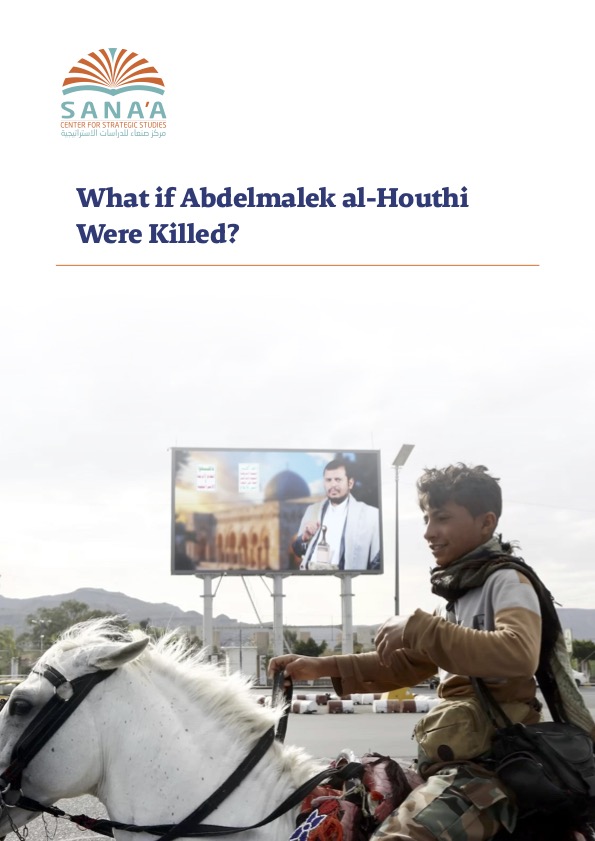As US airstrikes continue to target Houthi leaders in their strongholds, the prospect of Abdelmalek al-Houthi being eliminated raises important questions about the future of the group. This article first examines the significance of leadership within the Houthi group and the extent to which Abdelmalek al-Houthi influences it. It then challenges a narrative popular among some analysts that the Houthis are adept at leadership change, evidenced by the transition from Hussein al-Houthi to his brother, Abdelmalek, following Hussein’s death in 2004. To conclude, it presents scenarios likely to emerge if the US were to bring down the Houthi leader.
Divine Leadership
In many ways, the Houthis adhere to traditional Zaidi principles. At the core of Zayidi tradition is the belief that leadership should be limited to descendants of the Prophet Mohammed and that leaders must fulfill specific criteria, including being recognized religious scholars. Religious and political authority should be unified in a single individual—the Imam. Importantly, an imam is not considered infallible; if he becomes unjust, rebellion against him is considered legitimate. The history of Yemen’s imamate is marked by recurring conflict over leadership, particularly where the imam was perceived not to meet essential requirements, such as possessing sufficient religious knowledge or demonstrating strong leadership.
Several Zaidi Hashemite scholars have questioned Abdelmalek al-Houthi’s legitimacy due to his perceived lack of religious scholarship. His uncle, Mohammed Abdelazim al-Houthi, has openly challenged his authority. Others, such as respected scholar Mohammed Awadh al-Mo’yyidi, currently based in Sa’ada, have also refused to acknowledge Abdelmalek’s leadership.
Regardless, Abdelmalek wields absolute authority, with the group heavily centralized around him. His demonstrated leadership has enabled the Houthis to navigate through difficult times, capitalizing on key opportunities to consolidate and expand their power. He is known for delegating authority selectively to individuals who pose no threat to his position. This centralization reflects the evolving concept of leadership within the group’s ideology and Abdelmalek’s revered personal qualities.
In practice, while the Houthis openly align themselves with Zaidism, they have also introduced distinct ideological innovations that elevate Abdelmalek al-Houthi to a leadership role beyond question or challenge. “Alam al-Huda” (The Guiding Sign), Abdelmalek al-Houthi’s new title, exemplifies this. By adopting this term, his followers grant him a unique spiritual status that distinguishes him from the traditional Zaidi Imam. As Alam al-Huda, Abdelmalek is framed as a divinely guided spiritual leader of the Ummah, the Muslim religious community, whose authority must not be questioned.
The Houthis have also bypassed the requirement of religious knowledge by presenting the Qur’an as the sole source of authority while dismissing traditional Zaidi and broader Islamic scholarly heritage. This approach originated with Hussein al-Houthi, who positioned himself as a direct interpreter of the Qur’an to legitimize his ideas through scriptural reference. Hussein often delivered lectures framed as Qur’anic interpretations. Abdelmalek al-Houthi has continued in this tradition, offering his own interpretations of the Qur’an without adhering to classical exegetical traditions.
By all accounts, Abdelmalek al-Houthi continues to serve as the group’s undisputed leader, with no clear second or third in command. This centralization of power results in highly personalized leadership and lacks established mechanisms for succession or power-sharing—a recipe that could spell trouble.
Different Times
In analyzing the potential assassination of Abdelmalek al-Houthi, some analysts have drawn comparisons to the leadership transition following the death of Hussein al-Houthi, the group’s founder, in 2004. But this comparison is inaccurate for two main reasons: First, at the time of Hussein’s death, the Houthi movement was still in its early stages. Although ambitious, it lacked significant influence, resources, and stature. The relatively low stakes helped contain internal competition. Notably, there was a substantial gap between Hussein’s death and Abdelmalek’s rise as leader, nearly two years later, during the third round of the Sa’ada wars in November 2006. During this time, the Houthis, who were still a relatively small and primarily focused on localized conflict, were able to continue without a clear leader. By contrast, today’s group functions as a de facto authority ruling over a population of no less than 15 million people across a vast geographic area. Its current size, power, and complexity make any future leadership transition far more challenging. A swift transition is, therefore, not a fait accompli.
Second, at the time of the leadership transition, Hussein and Abdelmalek’s father, Badreddine al-Houthi, was still alive. He was a highly respected Zaidi scholar and leader, enjoying an undisputed position of authority. It was Badreddine who selected his younger son, Abdelmalek, as Hussein’s successor. Due to Badreddine’s revered status, even those who might have aspired to lead, including figures such as Hussein’s close tribal ally Abdullah al-Ruzami or prominent Hashemite military commander Taha al-Madani, accepted his decision without significant dispute. If the US were to remove Abdelmalek now, various scenarios could arise, largely depending on the circumstances of his fall.
Potential Scenarios
As it stands, the most probable outcome in the event of Abdelmalek’s assassination is an internal conflict between competing military leaders and prominent members of the al-Houthi family. Without a respected local Zaidi authority figure capable of mediating or guiding the transition, the dispute would likely remain unresolved without external intervention. In this situation, Iran’s role would be key. Its political and military backing for one of the rival factions could prove decisive in shaping the group’s future direction.
Such a development would carry far-reaching consequences. The group would become more closely aligned with Iran, both ideologically and operationally. Any successor to Abdelmalek would face significant challenges in establishing legitimacy. Abdelmalek secured his position through years of struggle, which included military victories and navigating crises. A new leader would need time, personal strength, and charisma to gain comparable authority and acceptance within the group.
The possibility of Abdelmalek being killed remains, in any case, largely hypothetical. He is notoriously secretive, frequently changes locations and whereabouts, and is known only to a small, trusted inner circle. He avoids using modern technology that could reveal his position, and targeting him would probably require longer-term intelligence, such as tracking movement patterns, which is unlikely to have yet been done. Still, the ramifications on the Houthi group if they were to lose Abdelmalek al-Houthi would be unprecedented and long-lasting.
This commentary is part of a series of publications produced by the Sana’a Center and funded by the government of the Kingdom of the Netherlands. The series explores issues within economic, political, and environmental themes, aiming to inform discussion and policymaking related to Yemen that foster sustainable peace. Any views expressed within should not be construed as representing the Sana’a Center or the Dutch government.

 اقرأ المحتوى باللغة العربية
اقرأ المحتوى باللغة العربية
